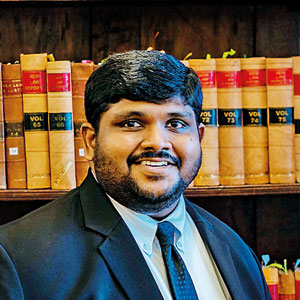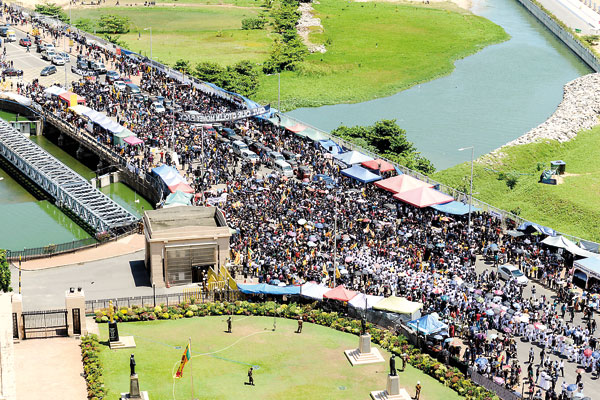News
Protesters demand rights; police demand duties as agitation continues
A young protester who was kicked in the neck by a policeman in front of Temple Trees on Friday has been admitted to the National Hospital of Sri Lanka – but no official record of it had been made by the Police as of Friday night.
“He sat down on the road in protest when Police took the banners out,” said a 31-year-old fellow protester, who wished to remain anonymous. The young man had proceeded to lie down on the road when Police continued to take the banners down. “That’s when the cop kicked him in the neck,” he said. He was admitted to the hospital in an ambulance parked at the Galle Face Green which protesters have renamed as ‘GotaGoGama’.

N.K. Ashokbharan
Police Spokesman Nihal Thalduwa denied knowledge of a “physical altercation”. According to him, the area OIC had only reported an exchange of heated words between protesters and police, when police took down posters pasted on police buses along the pavement. However, in a statement released earlier that day, SSP Thalduwa had claimed that the officer in question had been “acting in self-defence”.
Despite the spokesperson’s contradictions and denial, video footage showed the young man on the ground bleeding from his injury.
As the GotaGoGama revolt entered its 23rd day, protesters note that police are turning hostile and harassment by them is growing by the day.
Also on Friday in Batticaloa when Tamil National Alliance Parliamentarian Shanakiyan Rasamanickam was taking part in a protest near the shrine erected in memory of the slain ex-militant turned journalist Dharmeratnam Sivaram also known as Taraki, he confronted two policemen in plainclothes. They were trying to video the demonstration. “Do you do this to the crowds in Colombo?” he asked them.
When asked about the incident, SSP Thalduwa said, “There’s no rule prohibiting police from doing this.” He said he did not know if this practice was carried out in Colombo, too. Police action during a protest is guided by provisions in the Criminal Procedure Act, the Penal Code, and the Police Ordinance.”
He said the Police were well within their right to use reasonable force when a protest stops being peaceful. According to the SSP, a protest stops being peaceful when the law is broken and offences like causing public nuisances fall into this category.
He insisted that Police were well within their right to collect information, especially in a public setting. “If Police want to, there are ways to track protesters anyway. So much content is uploaded to social media from the sites on a daily basis. If people can take videos of policemen why can’t Police do the same?”
He denied that the long arm of the law was dealing differently between the North-East and the Southern parts of the country. “We uphold the law regardless.”

GotaGoGama revolt on its 23rd day. Pic by Indika Handuwala
Claiming that Batticaloa police officers had not disturbed the protest in any way or infringed on citizens’ freedom of expression, SSP Thalduwa noted that the officers were only carrying out their duty and they were under no obligation to disclose why the march was being recorded. “We can’t do our duty with our hands tied behind our back.”
Challenging his views, civic activist and lawyer N.K. Ashokbharan said, “When publicly funded law officers exercise their authority, reasonable grounds must exist and they are answerable to the public. They cannot act arbitrarily, capriciously, unfairly and illegally, in a way that violated the constitutional rights of the citizens.”
These incidents follow weeks after a protester was shot dead by police in Rambukkena.
The Police spokesperson refused to comment on the killing of protester Chaminda Lakshan in Rambukkena pointing to the ongoing court case, but held the view that Police too were entitled to the right to self-defence when their self or another was in danger.
While a majority of the protests countrywide are peaceful, state action to deter the displays of dissent is on the rise. Posters of journalists killed or attacked were taken down by Police this week from the GoGotaGama site.
Last Sunday several in Colombo were barricaded to prevent an anti-government march organised by the Inter-University Students Federation from reaching Galle Face Green. Although tensions ran high, the protestors managed to make it to the protest site via alternative routes at sunset after they led a march to the Prime Minister’s Wijerama Road residence.
Meanwhile, Northern Province people, although cautious in the initial stages of the protest wave, are now cautiously coming out in solidarity with protesters in the rest of the country.
“I cannot imagine organising a protest here in the North similar to the one in Colombo,” said Leelavathi Aananthanadarsa, Secretary of the North-Eastern Association of Relatives of Enforced Disappeared Persons.
She recalled a recent incident that involved a protest organised by the mothers of the disappeared when Prime Minister Mahinda Rajapaksa visited the North. The mothers were assaulted and threatened by the police while they were still far away from the event attended by the Premier. “When you think about how police personnel treated them, the constant surveillance and the harassment by the authorities, how can we organise a protest? I don’t want to see our elderly mothers and relatives being mistreated by the police and Military.”
Lawyer Ashokbharan pointed out that the right to protest had been guaranteed by several articles in the Sri Lankan Constitution. “The freedom of expression in Article 14(1) includes the right to express yourself by word of mouth, action, holding placards etc.”
He said courts had interpreted this to be holding banners and publications. The freedom of peaceful assembly is guaranteed by article 14(1)(b). “The key word is ‘peaceful” assembly’. The right to gather as a group is covered by the freedom of association in article 14(1)(c).
Besides, Article 12, its sub articles, Article 11, and Article 13 protect a person’s right to equality, protection from torture, and protection from unlawful arrest and detention respectively. These are the fundamental rights which collectively protect a citizens’ with the right to protest, Mr. Ashokbharan noted.
These rights are limited by Article 15 which refers to limitations prescribed by law. Regulations passed under the public security ordinance are a limitation prescribed by law. “Academics have criticised Article 15 for being too wide since its wording does not call for limitations to be “reasonable” etc,” he noted, adding that this gave the state a dangerous amount of leverage.
The best way to say that you found the home of your dreams is by finding it on Hitad.lk. We have listings for apartments for sale or rent in Sri Lanka, no matter what locale you're looking for! Whether you live in Colombo, Galle, Kandy, Matara, Jaffna and more - we've got them all!

